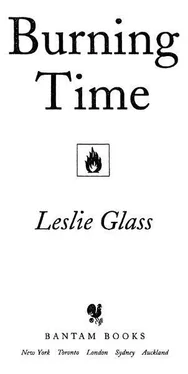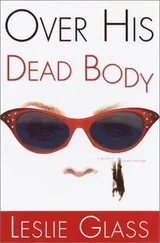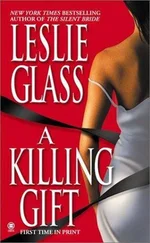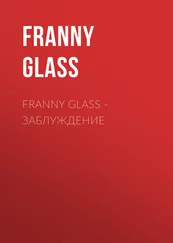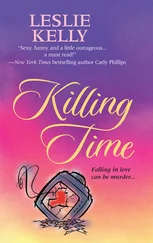In fact she was “watcher in the daytime,” too. She had to keep an old enemy in sight all the time. The unresolved conflict between her and her husband about living on the approach to the Triboro Bridge kept Arturo alive for her.
She sat in her chair going over and over how she hadn’t wanted to live near that bridge, even though the house Arturo found was brand-new, in a nice neighborhood. Three bedrooms, two bathrooms. A little place to grow roses and tomatoes in the back. Everything a person could want. Except for the bridge. You could always tell what day it was and what hour it was by the amount of traffic heading on and off the ramp to the bridge. Even with two panes of glass in every window Claudia could still feel the vibration.
She was having her usual argument with Arturo about it, as she sat in front of her window half the night, waiting for that big Irish cop who stopped at the diner every day. He went in to get something to eat and then sat in his car for twenty minutes afterward pretending he was doing some kind of paperwork. But she knew he was not really doing anything. Now he could do something.
He was there at eight-thirty. What Claudia Bartello wanted to do was call out to him, have him come to her so she could point out to him the problem. How close it was to her and how offensive.
But there was no way the cop could hear her. And maybe it wasn’t such a good idea to attract attention and let everyone see a cop coming to her house. She didn’t think she had any choice in the matter. She had to struggle down those steps that always made her feel like her heart was going to give out on the way back, like Arturo’s did. And then after she got down the steps, she’d have to hobble down the block to the diner. She didn’t like it, but she did it.
When she got there, the way the big cop looked down at her from a great height made her feel like an old, old woman.
“I’m Mrs. Bartello.” She peered up at the name tag on his chest but couldn’t make out the letters.
“Good morning, Mrs. Bartello,” he replied pleasantly.
“It’s not a such a good morning,” she snapped. “I didn’t sleep at all.”
“I’m sorry to hear it.” They were standing outside, by his car. He looked down at her with a big friendly smile, like she was his great grandmother with a hip complaint. Well, she had a complaint all right, but it wasn’t about joints.
“There’s a woman in my garage apartment, walking around naked for all the world to see,” she told him angrily. “I don’t like that kind of thing.”
“Hmm. What’s she doing there?” he asked.
“That’s a good question. He said he wouldn’t have no women or parties.” Claudia was indignant.
“Who’s that?”
“My tenant.”
“You have a tenant, and he has a girl in there. Is that the problem?” he said, smiling just a little bit.
“My name is Mrs. Arturo Bartello,” Claudia said. “That’s my house, right there. Fourteen twenty-five Hoyt Avenue. I don’t want no women there.”
“Have you talked about this with your tenant?” the cop asked.
“No, I have not. How can I with her still there?”
“How do you know that?”
“I watched the door. He was out. He came back. She didn’t leave. That young man was out half the night with the woman in there. She’s got some kind of thing on her forehead. I don’t like it at all.”
The cop frowned. “What kind of thing?”
“I don’t know. Like blood or something. Maybe he beat her, too.”
“And you could see all that?” he said, like maybe she was making something like that up.
“Course I could see it. She was standing right in front of me, no clothes, waving at me like some kind of crazy woman. Probably taking drugs. I won’t have that. I have my rights.” She paused for a breath. “You’re a cop. Take care of it for me.”
“What would you like me to do? Do you have any reason to believe he’s doing drugs? Or is it the woman in the house that’s bothering you?”
She hesitated. It was both and everything that was bothering her. His head was tilted like he was really waiting for her answer. But then he didn’t wait for one.
“Maybe you should just wait for the woman to go, and then have a talk with your tenant. Tell him how you feel.”
Claudia was getting tired standing there getting nowhere.
He tried another tack. “If you think he’s doing something illegal, like drugs, you can make a complaint. You want to do that?”
“I’ll think about it,” she said. “What’s your name?”
“Police Officer O’Brien,” he said. “Let me know if you have any trouble.”
She turned around and started hobbling back. Fat lot of good that did. She saw that he made a note and then sat in his car for a while just like he always did, digesting his breakfast without a worry in the world.
59
There was not a clock anywhere. That scared Emma as much as some of the other things. She had lived with so many clocks for so long, not having a single one to look at now made her feel her time was running out. When she was awake she was thinking all the time. Gimme a clock and a machine gun. Please God give me a knife, just a little one . Half the time she was too terrified almost to breathe, and then she got angry. The air was stale and stuffy. The guy had all the windows closed. Every breath she dared to take was foul. The brown curtains were tied back, but the roller shades were down. She couldn’t see out, couldn’t see the light.
What she saw was a lot of peculiar stuff laid out on a table the guy put by the bed. What scared her most was the black box that looked like a car battery. You could kill someone jump-starting a car. He must know about that, too. It happened to some boy just after she moved to California. It was in the papers. Emma shuddered. It happened miles away, in another county, couldn’t have been him. Don’t let it have been him. It was hot in the room, but she couldn’t stop shivering.
She didn’t like looking at him. He wore a motorcycle jacket and tight black jeans. He kicked the furniture with his motorcycle boots, his face twitching with rage.
She had to close her eyes to get away from him. The guy was crazy, and furious at her for untying the ropes he thought were secure. If she had a chance of survival before she untied the ropes, she didn’t have one now. Her hands were tied tighter now. He moved her around angrily, twisting her arms, and pinching her breasts, trying to make her cry. He flicked his lighter on and off, teasing her with it like a kid torturing a frog. Only she wasn’t a frog. The switchblade terrified her, too. It seemed to be his second-favorite toy. He had a name for it. He called it Willy. Sometimes he put the lighter in his pocket in the tight black jeans and fondled it there. But the switchblade was always out. He stabbed at the air with it when he got frustrated.
What was the worst thing that could happen? Emma asked herself the question the way she had as a kid when they played war games. What was the worst pain a person could take? How many hours, how many days could pain last? What could they do to stop it? On navy bases all around the country they used to play the game. What if Daddy were caught and put in a tiger cage? What would he do? What would I do if it were me? What if I were a captured spy? What if our ship went down in the ocean, and there were a thousand sharks circling our lifeboat? Survival. How did survivors make it out? There were a hundred hundred hero stories from a hundred hundred battles, and every story absolutely true. Navy juniors knew them all, and in all their stories the hero always got away. Now she was a captive who’d had a chance and didn’t get away.
Why didn’t she get away? In the movies the heroes got away. Only the walk-ons were strangled, got their throats cut. What was the battery for?
Читать дальше
